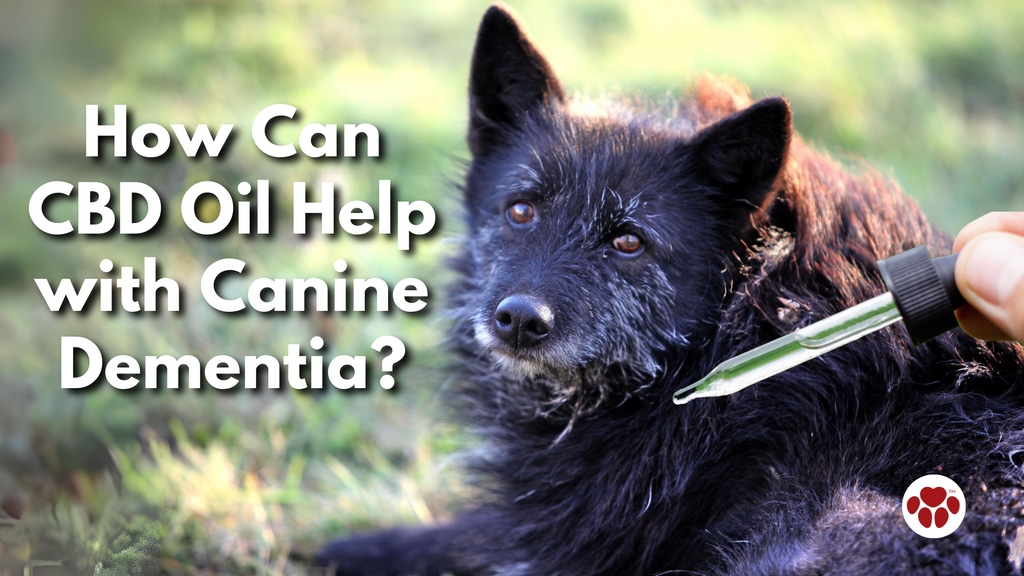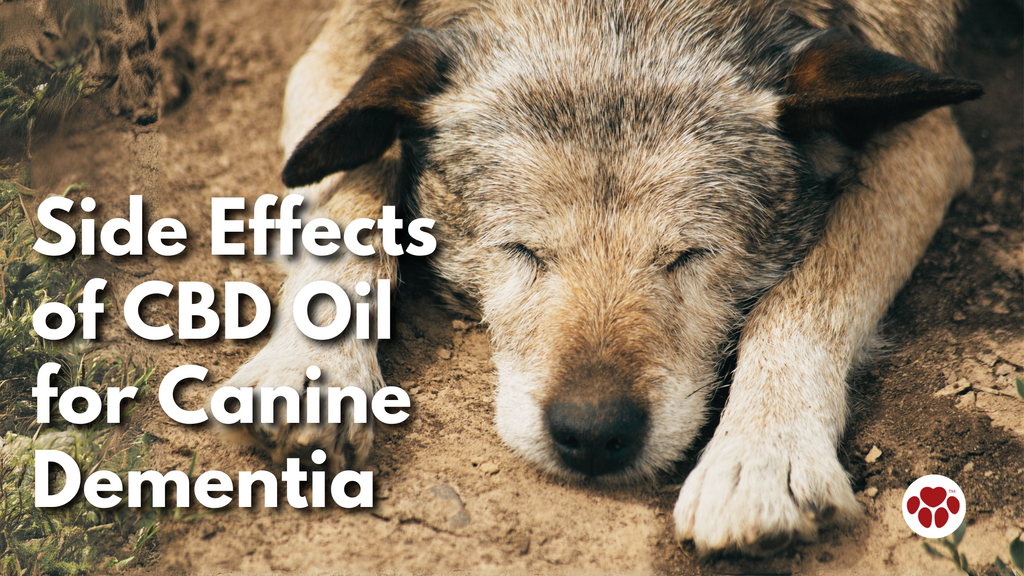
Cognitive Support: Examining the Role of CBD Oil in Canine Dementia Care
|
|
Time to read 9 min
|
|
Time to read 9 min
Cognitive support for canines encompasses various strategies and interventions aimed at maintaining and enhancing cognitive function, particularly in aging dogs experiencing cognitive decline.
This can include nutritional supplements, environmental enrichment, and mental stimulation to support overall brain health. As dogs age, they may experience changes in behavior, such as disorientation, altered sleep patterns, or decreased social interaction, which can indicate gradual loss of cognitive abilities.
CBD oil has gained attention for its potential neuroprotective interventions in aging dogs, with studies suggesting it may have positive effects on cognitive function.
The neuroprotective potential of CBD is due to its anti-inflammatory and antioxidant properties, which are under intense preclinical research in numerous neurodegenerative disorders (Fernández-Ruiz, et al, 2013).
Understanding and addressing behavioral changes and providing appropriate cognitive support can significantly improve the quality of life for aging dogs.
 What Is Canine Dementia?
What Is Canine Dementia?
Canine dementia, also known as Canine Cognitive Dysfunction (CCD), is a neurodegenerative condition in aging dogs characterized by a range of cognitive deficits, such as disorientation, anxiety, and memory impairment.
Cognitive deficits in dogs with CCD may manifest as changes in social interaction, sleep-wake cycles, and house training. These symptoms often cause distress for both the affected dog and their human companions.
 What are the Signs and Symptoms of Canine Dementia?
What are the Signs and Symptoms of Canine Dementia?
The signs and symptoms of Canine Cognitive Dysfunction (CCD) encompass a spectrum of behavioral and cognitive changes.
Owners may notice changes in their dog's sleep-wake pattern, such as nighttime restlessness or increased daytime napping. Dogs with CCD may exhibit altered interactions with family members, decreased interest in toys or activities, and changes in house-training habits.
These behavioral changes often accompany cognitive decline, which can manifest as impaired spatial orientation, reduced problem-solving abilities, and struggles with recognizing familiar people or objects.
Clinically, dogs with CCD may present with an array of physical symptoms, such as a change in gait, altered appetite or weight loss, and incontinence, which can further signify the progression of the disease.
Signs usually start to manifest at around nine years of age but are usually underdiagnosed because owners would usually think they are just normal signs of aging.
It's important for pet owners to recognize these signs and seek veterinary care for appropriate assessment and management strategies. Veterinarians can rule out other possible diagnoses causing the same clinical signs.
 What are the Causes of Canine Dementia?
What are the Causes of Canine Dementia?
The causes of Canine Cognitive Dysfunction (CCD) are multifactorial, often linked to aging-related neurodegenerative processes, including neuroinflammation, oxidative stress, and the accumulation of beta-amyloid plaques creating toxic condition in neurons, necessitating the exploration of neuroprotective interventions such as L-deprenyl or selegiline.
CCD can also be influenced by genetics, environmental factors, and overall health status. Aging contributes to cognitive decline as the brain undergoes changes in structure and function over time.
Neurodegeneration is a key factor in the development of cognitive dysfunction, impacting memory, learning, and decision-making abilities. Pathological processes such as inflammation and oxidative stress can accelerate cognitive decline.
It is essential to address these factors to mitigate the progression of CCD. Research suggests that neuroprotective antioxidants and proper nutrition play a fundamental role in preserving cognitive function and enhancing quality of life for aging dogs.
The study of Milgram, Head, and Zicker (2004) on beagle dogs showed that behavioral enrichment and dietary fortification with antioxidants can slow age-dependent cognitive decline in older dogs, and the two treatments together are more effective than either alone.
 How Can CBD Oil Help with Canine Dementia?
How Can CBD Oil Help with Canine Dementia?
CBD oil has emerged as a promising intervention for addressing Canine Cognitive Dysfunction (CCD) by offering neuroprotective properties, mitigating oxidative stress, modulating mitochondrial dysfunction, and alleviating neuroinflammation, thereby potentially ameliorating the clinical signs of cognitive impairment in aging dogs.
Studies have shown that CBD exerts its neuroprotective effects by influencing the endocannabinoid receptors and promoting neurogenesis, which may contribute to the preservation of cognitive function.
Moreover, full-spectrum CBD oil such as Paw Origins CBD Full-Spectrum Happy-Furever™ Oil takes advantage of the entourage effect to attain the full benefit of CBD Check out "CBD For Dogs Review".
CBD oil for dogs has been found to modulate oxidative stress by reducing the production of reactive oxygen species and enhancing the activity of antioxidant enzymes, thus protecting neurons from damage.
Its ability to mitigate neuroinflammation through interactions with immune cells and cytokines brings potential relief to the cognitive symptoms associated with CCD.
The modulation of mitochondrial dysfunction by CBD oil may help in preserving cellular energy production and maintaining neuronal integrity, further supporting its potential as a therapeutic agent for managing CCD in aging dogs.
The study of Silvestro, et al (2020) showed the therapeutic potential of CBD for managing neurological diseases like epilepsy, Alzheimer's, multiple sclerosis, and Parkinson's through multi-target mechanisms.
 What are the Benefits of CBD Oil for Canine Dementia?
What are the Benefits of CBD Oil for Canine Dementia?
The benefits of CBD oil for Canine Cognitive Dysfunction (CCD) extend to its neuroprotective and antioxidant properties, which may contribute to the preservation and enhancement of cognitive function in aging dogs, addressing the clinical signs associated with CCD.
CBD oil has been found to support the endocannabinoid system of dogs, playing a crucial role in regulating various physiological and cognitive processes in the body.
Its neuroprotective effects are particularly significant in safeguarding neurons from damage and degeneration, which is essential for maintaining cognitive abilities in aging dogs. Read about "Understanding CBD Oil for Dogs".
CBD oil such as the Paw Origins CBD Full-Spectrum Happy Furever™ Oil has potent antioxidant properties enable it to combat oxidative stress and reduce the damage caused by free radicals in the aging brain, thereby alleviating the cognitive symptoms associated with CCD.
It effectively targets inflammation and oxidative damage, which are prominent features of cognitive decline, ultimately lending support to the aging dog's cognitive abilities.
Through these mechanisms, CBD oil not only offers potential relief from the symptoms of CCD but also aids in promoting overall brain health in aging dogs. Check "Will CBD Calm My Hyper Dog?".
This natural supplement presents a promising avenue for managing cognitive decline, improving quality of life, and supporting the overall well-being of senior canine companions.
 What are the Side Effects of CBD Oil for Canine Dementia?
What are the Side Effects of CBD Oil for Canine Dementia?
While CBD oil shows promise in managing Canine Cognitive Dysfunction (CCD), it is essential to consider potential side effects and safety concerns, including dosage-related issues, particularly in the context of veterinary medicine and the endocannabinoid system. Read "CBD Oil for Dogs: Safety and Effectiveness Explained".
Various studies have indicated that CBD oil may lead to side effects in dogs, such as drowsiness, dry mouth, lowered blood pressure, or an increase in liver enzyme levels. The dosage of CBD oil for CCD should be carefully monitored, as high doses can potentially lead to adverse effects. Check "CBD Dosage Chart for Dogs".
In the context of veterinary medicine, it is important to consult a professional before administering CBD oil to dogs, especially if they have pre-existing conditions or are taking other medications. Understanding the endocannabinoid system's role in dogs is crucial for ensuring the safe and effective use of CBD oil for managing CCD.
 How to Administer CBD Oil to Dogs with Dementia?
How to Administer CBD Oil to Dogs with Dementia?
The administration of CBD oil to dogs with Canine Cognitive Dysfunction (CCD) involves careful dosage considerations and the selection of high-quality, authentic CBD products or hemp extracts such as Paw Origins CBD Full-Spectrum Happy-Furever™ Oil, aiming to provide neuroprotection, alleviate oxidative stress, and address free radical damage associated with mitochondrial dysfunction.
When assessing the authenticity and quality of CBD products, it is essential to look for third-party laboratory testing and certification. These indications are critical in ensuring the purity and potency of the CBD oil for dogs. Understanding the specific hemp extract used in the product can provide insights into its efficacy.
When considering the dosage, it's crucial to start with a low amount and gradually increase it, closely monitoring the dog's response and consulting a veterinarian for personalized guidance.
Authentic CBD products sourced from reputable suppliers are essential to ensure the purity and potency of the oil, thus maximizing its potential neuroprotective effects.
It's important to emphasize the impact of neuroprotection and the endocannabinoid system in managing cognitive decline. CBD's potential in supporting neural health by interacting with the endocannabinoid system should be considered when determining the appropriate dosage for dogs with CCD.
Some of the common methods for administering CBD oil to dogs with CCD include oral consumption, where the oil is mixed with their food or placed directly in their mouth. Topical application on the skin can also be effective in some cases.
 What are the Other Treatment Options for Canine Dementia?
What are the Other Treatment Options for Canine Dementia?
Along with CBD oil, various other treatment options exist for managing Canine Cognitive Dysfunction (CCD), including prescription medications, nutritional supplements, environmental enrichment, and behavior modification techniques, providing a comprehensive approach to addressing CCD in aging dogs.
Prescription medications such as selegiline and propentofylline play a critical role in managing Canine Cognitive Dysfunction (CCD). These medications are designed to target the underlying causes of CCD, such as beta-amyloid protein accumulation and neuronal dysfunction, thereby aiding in the restoration of cognitive abilities in affected dogs.
Alzheimer's-related cognitive decline in canines also benefits from the use of prescription medications tailored to alleviate symptoms and slow down the progression of the disease.
The involvement of veterinary surgeons and specialists in veterinary medicine is crucial for accurately diagnosing CCD, prescribing appropriate medications, and closely monitoring the response and potential side effects in canine patients.
Their expertise ensures that the chosen medications align with the specific needs of the dog and contribute to improving their quality of life.
Nutritional supplements play a vital role in providing cognitive support for aging dogs with Canine Cognitive Dysfunction (CCD), often incorporating elements such as omega-3, neuroprotective antioxidants, and specialized formulations like golden paste to enhance cognitive function and well-being.
Omega-3 fatty acids, particularly DHA and EPA, have been shown to support brain health and cognitive function in aging dogs, reducing the progression of CCD. Neuroprotective antioxidants, such as vitamins C and E, selenium, and flavonoids, help combat oxidative stress and inflammation in the brain, potentially slowing down cognitive decline.
The combination of these nutritional supplements can provide comprehensive support for cognitive function in aging dogs, improving mental acuity, promoting a better quality of life, and potentially delaying the onset or progression of CCD.
Environmental enrichment serves as a fundamental aspect of managing Canine Cognitive Dysfunction (CCD), providing cognitive stimulation, addressing behavioral changes, and potentially mitigating cognitive defects and memory impairment.
Such enriching activities may include interactive toys, regular exposure to new environments, and engaging in playtime challenges. These initiatives aim to stimulate the cognitive abilities of dogs by offering novel experiences and promoting mental agility.
Behavior modification techniques provide a holistic approach to improve the quality of life for senior dogs experiencing cognitive decline. By employing positive reinforcement and environmental enrichment, caregivers can effectively stimulate their dogs' cognitive function, delay the progression of CCD, and reduce the associated anxiety and confusion.
 Frequently Asked Questions
Frequently Asked Questions
Cognitive support refers to the use of different strategies and interventions to help improve cognitive function, memory, and overall brain health. This can include various medications, supplements, and lifestyle changes.
CBD oil has been shown to have neuroprotective and anti-inflammatory properties, which can help improve brain function and reduce symptoms of dementia in canines.
While more research is needed, CBD oil has been found to be generally safe for dogs with dementia. However, it is important to consult with a veterinarian before starting any new treatment.
CBD oil can be administered orally, either through drops or mixed into food. It is important to follow the recommended dosage for your dog's size and to monitor their response to the oil.
Some possible side effects of CBD oil in dogs may include drowsiness, changes in appetite, or gastrointestinal upset. However, these side effects are rare and usually mild.
There is currently no known cure for canine dementia. While CBD oil has shown promise in improving symptoms and slowing the progression of dementia, it should not be considered a cure. Other interventions and lifestyle changes may also be necessary for the best results.